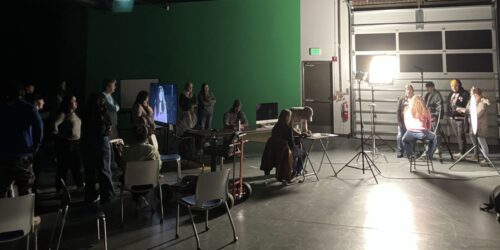
Boise State University offers several community outreach opportunities, but in Brittney Gehrig’s French 400 class, they are taking it a step further and learning about a minority you may not think about while in the Treasure Valley. French 400, Careers and Community, is a two-credit course focused on real-life French-speaking, outside of the classroom. This Spring, they are conducting a collaborative project with two other departments, Film and Humanities, and interviewing Francophones in the Boise area. Francophones, if you didn’t know, are French speakers who aren’t necessarily from France. This could include French speakers from Quebec, Canada, or people from French-speaking areas such as West or North Africa. There are many ways these Francophones may have ended up in the Treasure Valley, many being refugees who left Africa and ended up over here. The French, film, and humanities students are eager to learn about the lives of these people and learn about other minorities in the area who maybe don’t get their stories told as much as they should.
I sat down and talked to Brittney Gehrig, the French 400 lecturer and catalyzer for this project, and she said the class itself, as well as the project, has evolved and shaped itself into something bigger than it started. “I think we really needed it to start as a way for the students to speak French and reach out to their community, but we realized very early that it could be so much more than that,” Brittney told me, adding later that “…it looks very different than it started, originally it was just ‘interview a French speaker in the community’ with no project attached and now it has become something completely different.” The project now involves Rulon Wood and his film studies class, and Kyle Boggs and his humanities and culture class, where each class has a specialty to make the project as well-rounded as possible. The French students will be conducting the interviews entirely in French, as well as helping with translating questions, the film students will be filming and editing the footage, as well as getting the b-roll for the documentary, and the humanities students will be conjuring up effective questions, making publications, writings, and outreach for the documentary. Every student team has various skills to work with to create a personal connection with their interviewee and get great footage of them talking about their life path, identities, and way of life now in the Treasure Valley.
I talked to Elanor Spring, a student in the French 400 class, about her group and how their project is going, and she gave me insight into what the project is looking like in her eyes. She is working with Gianna Donnabella, Kendall Ball, and Gillian Osterburg, film students, and Samantha Wiss and Malisza Martin, humanities and cultural studies students. Elanor told me that they are going to be interviewing Yannick, a former resident of the Congo in Africa who came over to the United States on a work visa. He moved from the Congo and his job as an accountant and originally arrived in the South. After figuring out that the South was not his place, he eventually made his way up to the Treasure Valley. Yannick also speaks seven languages, including English and French. Elanor concluded that “…we all have this language that unites us and we [also] all have these other things that are different; it’s this beautiful marriage between culture and language.”
The goal of this project is to highlight different communities in our local area so that both the students and the greater Boise community can experience and learn about a culture unlike their own. French speakers are all around us in the Treasure Valley but are oftentimes overlooked because they don’t match the stereotypical description we think of a French person to be, as taught in our classes. It was very clear to me through my interviews that many teachings of language and culture rely on the home country of that language, but (especially with a language like French), there is so much more out there and so many other cultures that utilize French such as the Congo or Haiti. Brittney told me that this project is “not just for French students, not just for film students, but for anybody who is curious about other people and the Francophone world.” She hopes to present the project in a documentary setting such as the Luminary on campus or another space similar so that anyone in the community interested can learn all of the insights the students learned throughout the project.
Elanor said that she and her group are “ready to go”, having their fully-french interview on March 28th, and that “they have a lot of passion”. The passion of the students is what’s driving the project forward, and with their collaboration, they can present a Boise Francophone’s life in a way that you and I would never have imagined in a typical classroom setting. “I think it’s really worth noting how enthusiastic the students are from the three classes and how open and flexible they are with the process,” Brittney told me. The end product should be something that resonates with the entire community, providing opportunities for learning, expanding horizons, and gaining insights into the world of non-English speakers in the Treasure Valley.